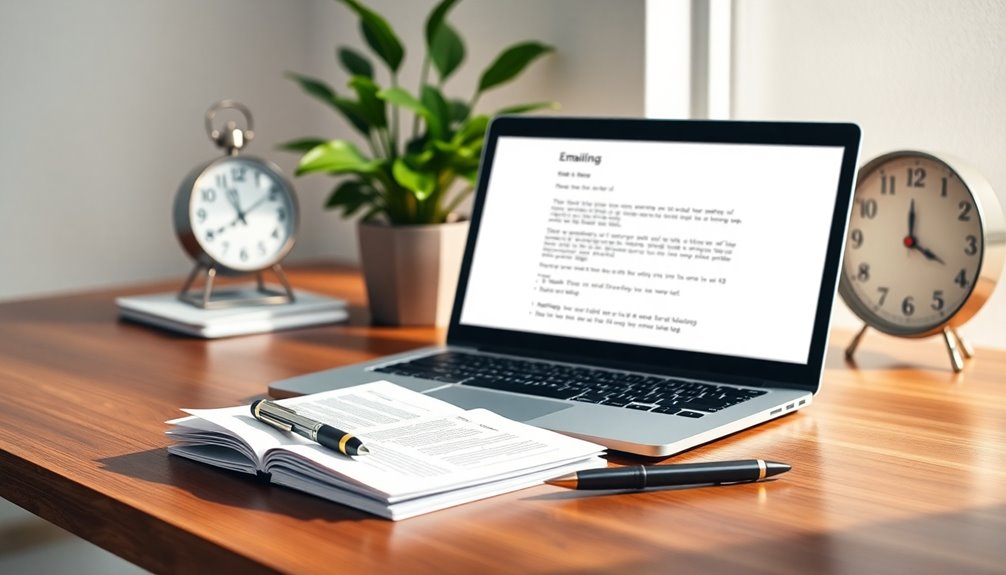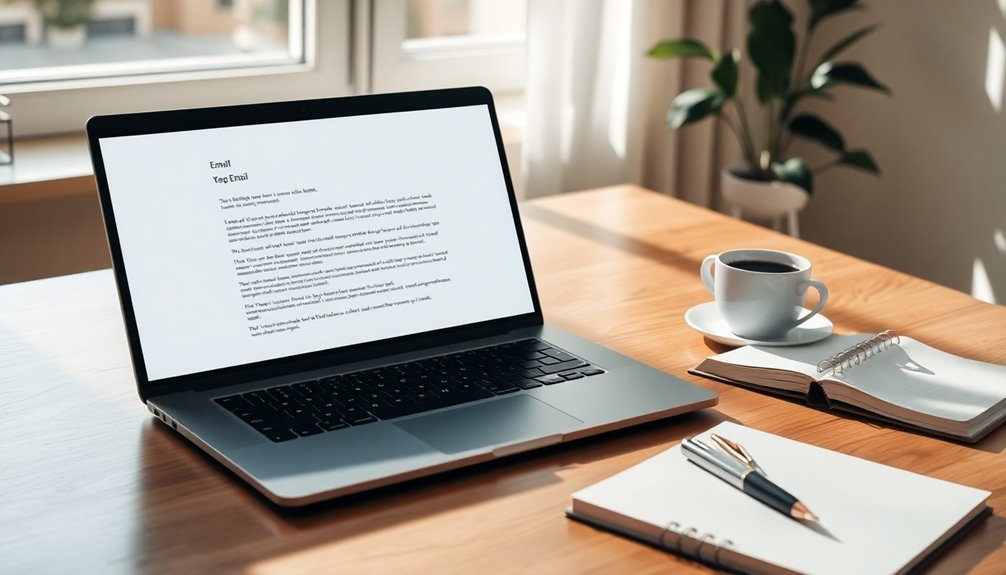To write a negotiation email that works in your favor, start by expressing gratitude for the job offer. Use a clear subject line like "Salary Negotiation Request." Clearly articulate your professional value by highlighting accomplishments and industry benchmarks to justify your desired salary. Keep your email concise, ideally within three to four paragraphs, maintaining a respectful tone throughout. Avoid aggressive language and be prepared to explore alternative compensation options. This approach not only showcases your worth but also enhances your chances of success in negotiations. You'll uncover more tips and strategies to strengthen your email further.
Key Takeaways
- Start with gratitude for the offer, setting a positive tone and maintaining goodwill throughout the negotiation process.
- Clearly articulate your professional value and justify your salary request with quantifiable accomplishments and industry research.
- Use a concise and clear subject line like "Salary Negotiation Request" to improve email response rates.
- Maintain a respectful and professional tone, avoiding aggressive language to foster a constructive discussion.
- Explore alternative compensation options if salary negotiations are limited, showing flexibility while still aiming for fair compensation.
Introduction

Negotiating your salary can feel daunting, but it's a crucial step in securing the compensation you deserve. Whether you're responding to a job offer or seeking adjustments to your current compensation package, crafting a well-structured salary negotiation email can make all the difference.
Many candidates overlook this opportunity, with research showing that only 37% negotiate their salaries. By doing so, you can avoid a potential loss of up to $500,000 by age 60.
In your email, start with a clear subject line that sets a professional tone. Express gratitude for the job offer, then articulate your salary expectations based on market value and industry standards. This is where a salary negotiation email example can guide you.
Showcase your value to the company by highlighting personal achievements and contributions, as candidates who do this often achieve an 85% success rate in negotiations.
Be open to discussing alternative compensation options, such as bonuses or professional development opportunities. Remember, effective negotiation isn't just about the numbers; it's about establishing your value and ensuring you receive fair compensation.
With the right approach, you can navigate this process confidently.
Establishes Your Professional Value

Articulating your professional value effectively can set you apart during salary negotiations. To negotiate your salary successfully, it's crucial to provide evidence of accomplishments that showcase your contributions in previous roles. Quantifiable results not only justify your salary request but also position you as an invaluable asset to the company. Additionally, demonstrating your ability to adapt to different market conditions can further highlight your versatility and resilience as a candidate. A strong understanding of Bitcoin IRA regulations can also be beneficial if discussing financial roles, showcasing your knowledge in emerging investment strategies.
Researching industry salary benchmarks and market trends gives you solid data to assert your worth confidently in the salary negotiation process. When you highlight relevant skills and unique experiences that align with the company's goals, you strengthen your position and demonstrate your potential impact on their success. For example, understanding the US commercial security market outlook can provide insights into how your skills may align with industry growth. Moreover, showcasing your leadership skills can further enhance your profile, making you a more attractive candidate to potential employers.
A well-structured email that emphasizes your professional contributions enhances your perceived value. This approach makes it more likely for the hiring manager to take your salary expectations seriously. Additionally, understanding the importance of timely storytelling can help you frame your experiences in a way that resonates with the employer's current needs and priorities.
Effective Subject Line Usage

Crafting an effective subject line can significantly enhance your email's impact during salary negotiations. Start with a clear and concise subject line like "Salary Negotiation Request" to immediately convey the purpose of your email. This approach increases the likelihood of your email being opened and read by the recipient.
Avoid including specific salary figures in the subject line, as this can lead to biases. Instead, focus on the position name or job title to help the recipient quickly assess the relevance of your email amidst their busy inbox.
Using a professional tone in your subject line sets a positive first impression and reflects your seriousness about the negotiation process. Research shows that well-formulated subject lines improve email response rates, making it crucial for successful salary negotiations. Additionally, employing targeted campaigns can help you better tailor your email content to align with the recipient's interests.
Remember, your subject line is the first thing the recipient will see, so make it count. By following these strategies, you'll not only grab attention but also lay the groundwork for a productive discussion.
An effective subject line can significantly influence the outcome of your negotiation, so take the time to get it right.
Step-by-Step Salary Negotiation Email

After establishing a strong subject line, the next step is to structure your salary negotiation email effectively.
Start by expressing gratitude for the job offer, which sets a positive tone and builds rapport with your employer. Acknowledge the opportunity and your excitement about the position.
Next, clearly state your desired salary range based on thorough market research. Mention that only 37% of candidates negotiate their base salary, reinforcing the importance of this step.
Then, provide justification for your request by detailing specific accomplishments and contributions that showcase your value to the organization. This is crucial, as 85% of new hires negotiating successfully leads to improved outcomes.
Keep your email concise, ideally within three to four paragraphs. This not only demonstrates professionalism but also respects your employer's time.
Maintain a polite tone throughout, as this can significantly influence their willingness to engage in the negotiation.
Dos and Don'ts for Negotiation Emails

Navigating negotiation emails requires a careful balance of professionalism and assertiveness. Start by expressing gratitude for the job offer or your current position. This sets a positive tone and helps maintain goodwill.
Clearly state your salary expectations based on researched data, as candidates who do this have a stronger case—85% of successful negotiators present well-justified requests.
Highlight your accomplishments and contributions to bolster your position. This shows your value and justifies your salary request. However, avoid using aggressive language or ultimatums; keeping your tone respectful and professional increases the chance of a positive response.
If salary appears non-negotiable, don't neglect to explore alternative compensation options. Being open to additional benefits, like extra PTO or flexible work arrangements, can lead to a more attractive overall package.
Remember that clear communication is key throughout the process. Articulating your points effectively while maintaining a collaborative tone will enhance the dynamics of your negotiation.
Salary Negotiation Email Scenarios

When you're faced with salary negotiation scenarios, it's crucial to tailor your approach based on the context of the offer. Start by using a salary negotiation email template that includes a clear subject line. This sets the tone for a professional discussion.
Express gratitude for the job offer, as it helps maintain a positive relationship.
If the initial salary is lower than your expectations, don't shy away from addressing the proposed salary. Highlight your specific accomplishments and quantifiable results that justify your request for a higher salary. Remember, 85% of new hires who negotiate successfully receive raises, so it's worth making your case.
If the initial salary offer is non-negotiable, consider proposing alternative compensation options. Additional benefits like extra vacation time or professional development opportunities can enhance your overall package.
If you don't receive a prompt response, follow-up emails can keep the conversation active and show your continued interest. Timely communication is key in this process, so don't hesitate to reach out again.
With the right strategy, you can negotiate successfully and secure a compensation package that reflects your value.
Pro Tips for Writing Effective Emails

Effective email communication can make a significant difference in your negotiation outcomes. Start with a clear and specific subject line, like "Salary Negotiation Request," to immediately convey your email's purpose and boost open rates.
Next, greet the recipient professionally and express appreciation for the job offer. This sets a positive tone and establishes rapport.
When discussing your desired salary range, be direct and base your figure on market averages. Candidates who negotiate often see a significant rise in their lifetime earnings, potentially adding up to $500,000 by age 60.
To justify your salary request, highlight your accomplishments, showcasing how your skills align with industry standards and the company's needs. Recognizing key qualities that reflect your value can further strengthen your case.
Keep your email concise by limiting it to three or four paragraphs. This strategy helps maintain clarity, ensuring your key points are easily digestible for the reader.
Final Thoughts

As you reflect on your salary negotiation email strategy, remember that preparation and clarity are key. A well-crafted email can significantly impact your compensation over your career.
By leveraging industry benchmarks, you can strengthen your case for a higher starting salary. Only 37% of candidates negotiate their base salary, which means you have a unique opportunity to stand out.
When drafting your email, maintain a professional tone while clearly articulating your contributions to the company. Furthermore, understanding state-specific tax incentives can help you demonstrate the financial benefits of your requested salary. Additionally, knowing how to weather market fluctuations can provide insights into maintaining your value in a volatile job market. Developing a solid budgeting strategy can also help you articulate how the proposed salary aligns with your financial goals. Consider including your commitment to retirement savings to show long-term financial planning.
Outline your expectations and support them with data, ensuring your rationale is compelling. Researching salary adjustments and demonstrating how your skills align with industry standards can make a huge difference. Additionally, understanding production quantity variance can help you justify your request by linking your performance to the company's financial health.
Frequently Asked Questions
How Do You Write a Good Negotiation Email?
To write a good negotiation email, start with a clear subject line that grabs attention.
Thank the recipient for the opportunity, showing appreciation right away.
Then, state your desired salary range based on your research and market averages.
Justify your request by highlighting your relevant skills and accomplishments.
Keep your tone polite and professional throughout, fostering a positive dialogue and demonstrating respect for the recipient's position.
How Do You Write a Counter Negotiation Email?
To write a counter negotiation email, start with a clear subject line that indicates your intent.
Thank the employer for the offer and express your excitement about the role.
Then, present your desired salary range or figure, supported by industry research.
Justify your request by highlighting your accomplishments and their impact.
Keep a professional tone, and be open to further discussions or alternative compensation options to show your willingness to negotiate.
How to Write a Salary Negotiation Email When You Have Another Offer?
When you're writing a salary negotiation email with another offer, start by clearly stating your competing offer to strengthen your position.
Use a specific subject line like "Salary Negotiation Request" to grab attention.
Outline your desired salary based on market standards and the unique value you bring.
Emphasize your relevant skills and accomplishments with quantifiable results, and maintain a professional tone, expressing excitement for the role while acknowledging your options.
How Do I Write an Email Asking for More Compensation?
When you write an email asking for more compensation, start with a clear subject line that grabs attention.
Express gratitude for the opportunity, then confidently state your desired salary or range.
Justify your request by highlighting your accomplishments and relevant market research, showing your value to the company.
Keep the tone professional and polite, and reinforce your enthusiasm for the role while firmly stating your compensation expectations.








